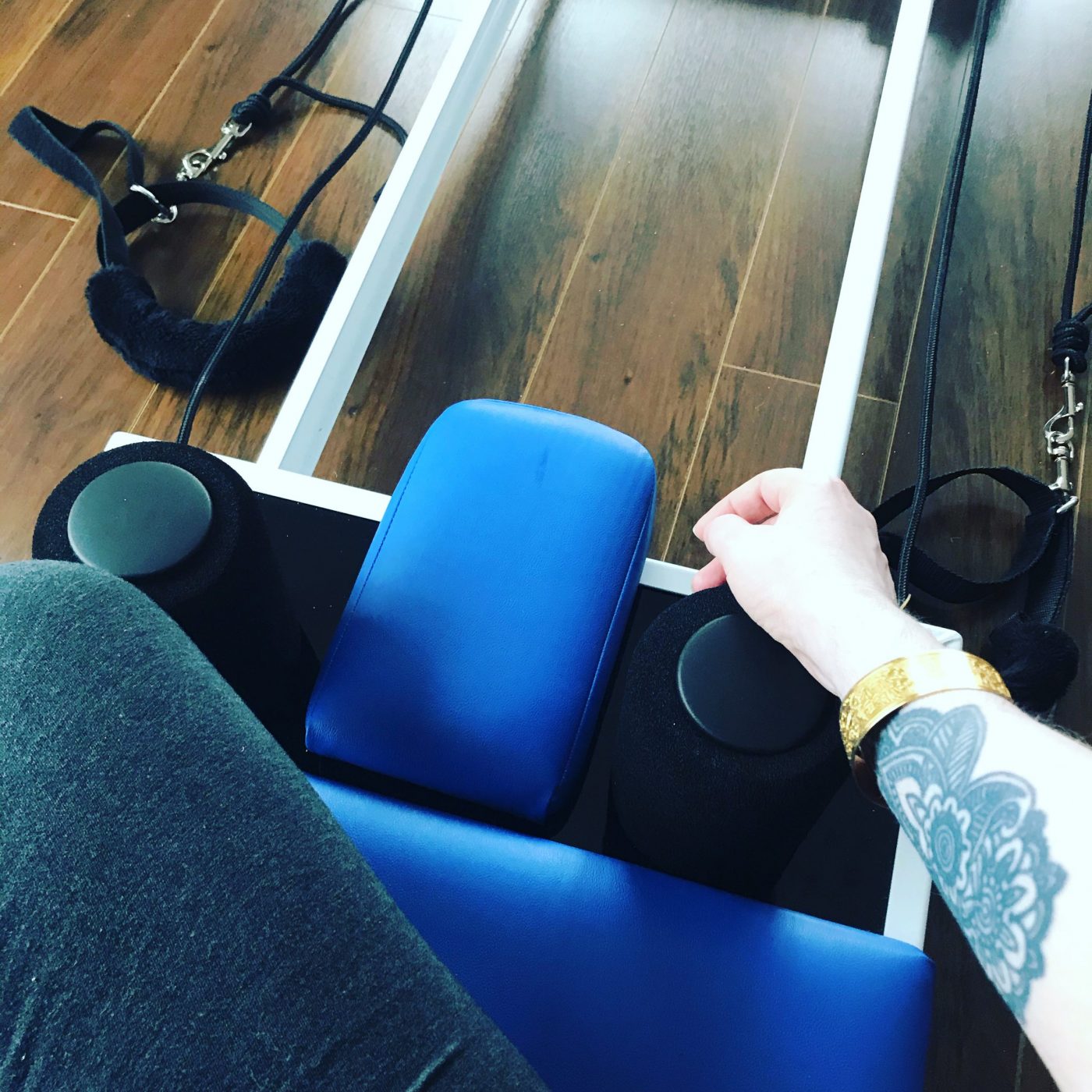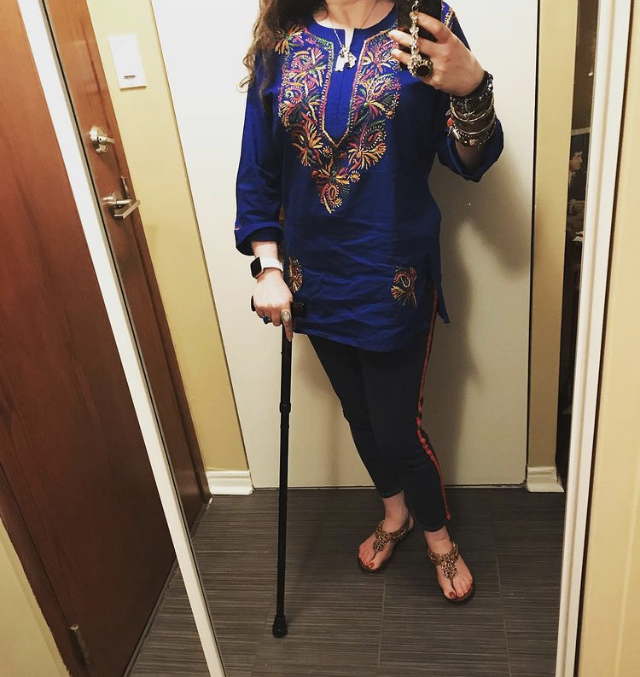In the spirit of Bell Let’s Talk Day I thought this was the perfect time to share my personal mental health journey as someone who has been living with Multiple Sclerosis. Here is my journey as a MS warrior.
It all started with my foot dropping, which would happen after walking for about 20 minutes. It would just go limp and lose all muscular ability to transition from heel to toe. It was happening for months, maybe even a year. I just simply shrugged it off as a result of wearing bad shoes, or just being out of shape. Other than walking (which I loved), I wasn’t a huge workout type of person. So the latter was a very logical conclusion for me.
In late spring of 2010, a casual mention of it to my father over breakfast (my father was an orthopaedic surgeon) immediately turned into an impromptu exam on the living room sofa. I didn’t know that something which I perceived as an innocuous foot drop can also indicate brain abnormalities. So he knew something was up. And that something wasn’t right. I could read it all on his face.

We soon found our way to Paris, Ontario where a family friend who was also a noted specialist, immediately took me in for an examination. He urgently referred me to a neurologist in London, Ontario. The earliest appointment was at the end of the summer.
To this day I still remember my father saying to me “Never hang your hat on the first diagnosis”, which meant that thanks to internet searches, and cold calls we found ourselves in the waiting rooms of three more offices. Offices of doctors who also couldn’t understand what was happening. A benign cyst was discovered on my spine, but the amount of pain and physical limitations I was having, it just didn’t add up. My days soon after were filled with MRI scans, blood tests and spinal taps.

We then headed to the Cleveland Clinic in Ohio, which left me absolutely deflated. Not because this doctor also couldn’t find an answer, but because he looked me in the eye (with my father by my side) and said that he felt that the majority of symptoms that I was experiencing was more in my head than in my body. Was I imagining this conversation? No. Because he kindly ensured that it was included in the report that we would receive later. Yes. The Cleveland Clinic.
So, by the time my appointment with the referral came around I wasn’t even sure it would be worth it. I just turned 40 a couple of weeks prior and I really was over it all. I was mentally ready to move on because out out of the four doctors I’ve seen thus far, three of them didn’t have any answers. Never mind that one who completely dismissed it altogether. So why bother seeing Doctor #5?
I was crushed and exhausted. Not only was all of this taking a physical toll due to all the poking and prodding, but it was taking a mental toll on me as well. I knew something was wrong. I could feel it. I could see it. But I felt like I wasn’t being heard. I had already resigned to the fact that whatever this was, it will just be something I’ll have to deal with and hope it goes away at some point.
However this time it was different. And it was thanks to an Evoke Potential Test. This monitored the body’s response rate to stimuli by measuring the travel speed of the electrical signals that make its way across the nervous system to the brain. This doctor ran them once. Repeated it. And then a third time. To this day I have no idea why the other doctors didn’t think do this test.
He knew what he saw.
One side of my brain was not sending/receiving these electrical signals fast enough, which explained why my right side was not functioning on par with my left. Combine those test results with my MRI scans, spinal tap results and the blood tests, it completed the puzzle and now a full picture came to fruition. He had the answer. It was no longer inconclusive. It was Multiple Sclerosis (MS).
MS is a potentially debilitating disease when the immune system attacks the protective layer (myelin) that covers nerve fibers and causes communication problems between your brain and the rest of your body. There are various strains of MS, the most common being Relapse Remitting (RRMS) where one lives a normal life and then will have an episode where the MS and all its related symptoms will appear. The episode commonly known as “flare ups” can vary in length from a few days to a few months. Those who have RRMS in some cases can transition to Secondary Progressive, where the MS symptoms are not experienced through these flare ups but are now remain constant. Primary Progressive is a far more serious version, where it’s just a slow and steady deterioration of the body. In Canada (where it holds the world’s highest rate of Multiple Sclerosis cases) 15 % percent of patients diagnosed with MS have Primary Progressive. I happened to be one of them.
My initial reaction was shock (although in hindsight I think the actual shock settled in much later), but more importantly for me, I was relieved. I am a problem solver by nature. So my immediate inclination was once we have finally identified the problem, it was time to work together on finding a solution.

Understanding My New Reality
Being diagnosed with Multiple Sclerosis at a relatively young age was definitely a shock to my system. And I didn’t have any one to relate to. My only pop cultural references of other MS warriors were actress Annette Funicello and comedian Richard Pryor. Both of whom near the end of their respective journeys were bound to a wheel chair and had limited speech. Was that in my future? And if so, how soon? Neurology is a vague space. And everyone is different. These thoughts were at the forefront because I was highly functional at the time. Outside of the foot drop issue and some nerve pain (which felt like someone was chewing my arm off) there was nothing else holding me back. I was able to continue my appointments with my team of three neurologists and a rehab specialist. Ongoing cognitive tests, semi-annual MRIs to track the lesions that appeared in my brain and physical rehabilitation became part of my day-to-day. I treated them all like work meetings. Show up and show out.
I also continued to travel. Colombia. France. England. Vietnam. Cambodia, Italy. Morocco. It was important for me and for my mental health that I continued with my activities like I did before. I also knew there will be a time where I won’t be able to do all of these things. So in reality, my desire to travel was not only to quench my wanderlust, but it needed to be done before the clock ran out, as I was now on a deadline.



Certain lifestyle changes needed to happen. Sneakers were in and stilettos were out. And boy, I sure loved my stilettos. Because my foot didn’t have the muscular strength to hold on to flip flops or slides, they made their way to the donation bin a well.
Due to increasing atrophy on my right side which also contributed to my balancing issues, I started Pilates with a private trainer. I also continued to work, flew to Indonesia to shoot my first documentary, and managed many freelance clients. On paper I had Multiple Sclerosis, but I felt fine for the most part.

Then one year it all caught up with me. It was 2016.
My body was telling me something. My MS has progressed.
My gait started to go wonky. My purposeful strides soon turned into penguin wobbles. Even though in my mind’s eye, I felt like I was still walking at the fast pace that I used to, in reality I was a lot slower which meant I needed to adjust my arrival times — and yes, my punctuality definitely suffered much to my frustration.
I started dropping things more often as my right hand’s grip strength decreased. Buttons were becoming harder to manipulate. Zippers were challenging my hand-eye coordination. Vertigo became a mainstay and I was hospitalized for a week due to an MS-related mini-stroke, which as you can imagine, freaked everyone out.
I incorporated a cane into my accessories collection. A decorative one for fancy places and a handy folding one to throw in my handbag just in case I needed it while running errands.


Stairs started to become unmanageable. I became more cognizant of uneven sidewalks and cobblestoned streets — thanks to the countless times I’ve rolled my ankle due to balancing issues. The sidewalk’s curb turned into an Olympic sized hurdle in my eyes. I started collecting gashes on my knees and scrapes on my palms and ankles from countless falls. It was akin to that scene in The Theory Of Everything when Eddie Redmayne as Stephen Hawking tripped over his dropped foot. That was me. Over and over again.
My cognitive issues have become more pronounced. Sometimes I need someone to repeat their instructions a few times for me to understand them. I am becoming more aware of the fact that I can’t seem to recall moments or conversations. Names just melt away. I can easily lose my bearings and get lost in a neighbourhood I know. I need directions to places that I have frequented mainly because my brain has decided to not store that information. As of late, I’m beginning to develop a bit of a stutter, very minor at this point but my brain is working at a different pace then my motor skills and I often find myself stuck repeating one word a few times while I’m trying to get the other word out. It’s almost like my mind is trying to start a stubborn car.
It’s My Problem That I Alone Can Manage
For the first five years since my diagnosis I didn’t broadcast my illness to those outside of my inner circle. I’m an intensely private person by nature and I just didn’t need to add that energy to the conversation. Also, I compartmentalize like a boss. So, whatever mental struggles I had, I would keep them inside and then basically pretend they didn’t exist. Or I would open that compartment per say, do a quick check-in before I close it up again. Whatever issues I had struggled with, I deemed it as something I alone could understand and address.
That took its toll on me and my mental health. I realized I would start to get anxiety over the smallest little things. Mainly because I didn’t have an outlet for my stress. Due to me suppressing it for so many years, it slowly started manifesting itself in the form of random panic attacks especially when it came to taking on additional work projects. This was a dead giveaway because I am someone who thrived on balancing deadlines, challenging tasks and pushing through. That was my jam. Now just the thought of it made me sweat.
My “Blue” Moods Were Something More
My thoughts would get darker and darker. Creating guests lists for my funeral. Wondering who would show up, would they remember me, would I matter to them by that point. As a single South Asian woman, who has held up on her own for years, I needed to summon up more strength for this journey as this journey was a solo one.
My neurologist pointed it out to me that those suffering from MS are naturally prone to depression due to a chemical imbalance. Therefore if I feel it coming on I should definitely recognize it and if I need it, they will be able to connect me to a mental health professional. But the first step is of course recognizing that I have it. And that has been a work in progress which I can happily say I’ve come a long way in this regard.
Being Seen As Broken
One thing that I can’t control is sensing the feeling of being viewed as broken, whether it’s from a stranger on the street, by a friend or even by a family member. That helplessness vibe that exudes from them is palpable and not helpful. So I gently let them know that it’s okay to feel the way they feel, but I am not broken and please don’t look at me that way. If I want to take a tandem canoe ride (with my life jacket on of course) or go for a long solo drive (thankfully I can still get behind the wheel), let me do it. No one understands my limitations better than I do. I’m not a proud person. If I can’t do it, I won’t. I need patience, not pity and I don’t need additional reminders of whom I have become.

Keeping A Proper Perspective
I have always kept a positive disposition. And continuing to do that has definitely helped me mentally. One thing that life has taught me is not to worry about things that I can’t control. It’s just a tremendous waste of energy. As stress is a big no-no for MS warriors, I try to limit that as much as I can. But of course life brings stress and stress is subjective. I try to stay in the moment and be present and take it day by day.
What Am I Missing?
One thing that has definitely come into focus is the idea of missing out or possibly losing moments. Sure, social media and FOMO hashtags don’t help. For me it boils down to jobs. I have a great career journey and now I am sitting in this puddle of reality that there will be certain projects and jobs that I either won’t be considered for, or that I will not take into consideration having already decided in my head that it won’t work. I can’t control the former, but I certainly need to change my outlook with the latter. It’s all about recognizing it, understanding it and then moving to change it. And all of that will take time. And patience. I will however, save my roving international war correspondent dreams for my next life.
The Value Of A Good Cry
There’s nothing wrong with a good cry. That is something I have learned along the way. There is no doubt that I’m a control freak, my Type A tendencies shine like diamonds. I know now that there are times that I can’t control what’s happening to my body and that’s okay. Letting it out is important. Bring on the tears I say. It’s healthy for my sanity too.
It’s Okay To Feel Sorry For Myself
This always had a negative connotation. Understandable in some instances but a hindrance in others. Depending on the context, I feel that having moments where I can absolutely feel sorry for myself is healthy. Overall, I move forward and embrace the limitations but also highlight what I can still do. Don’t get me wrong though. I have days where I just look at myself and wonder “why me?”. When I can’t handle a pen or a fork I’m frustrated. Not to sugarcoat things here, but having MS sucks. I know it could be way worse, but let me have this moment. There are so many things that I want to do, and knowing that I can’t do them is soul crushing. I let myself soak in my tears and then move on with a lighter heart. Because not only is it okay to feel sorry for yourself, it’s also very important to not let it linger.

It’s now been 10.5 years since my diagnosis and as it naturally tracks, this is the time where more of my limitations will come to shore. And that’s okay. I’m working on a healthy mindset, have a fantastic support system, and passion for life and Pilates (if you know you know). I’ve decided to enjoy some of my downtime, mapped out my first book and I’ve already picked the next country for my next trip (once we embark on a post-Covid world). I am also learning to not to self-censor myself out of any future happiness in any capacity. Just like anything in life, it’s all a work in progress. But it’s that work that I’m excited to put into motion.
If you like to connect or reach out, feel free to DM me on Instagram/Twitter @hinapansari.
Main Image Photo Credit: Hina P. Ansari, Unsplash.com (medication)
Hina P. Ansari
Author
Hina P. Ansari is a graduate from The University of Western Ontario (London, Ontario). Since then she has carved a successful career in Canada's national fashion-publishing world as the Entertainment/Photo Editor at FLARE Magazine, Canada's national fashion magazine. She was the first South Asian in...


















































































































